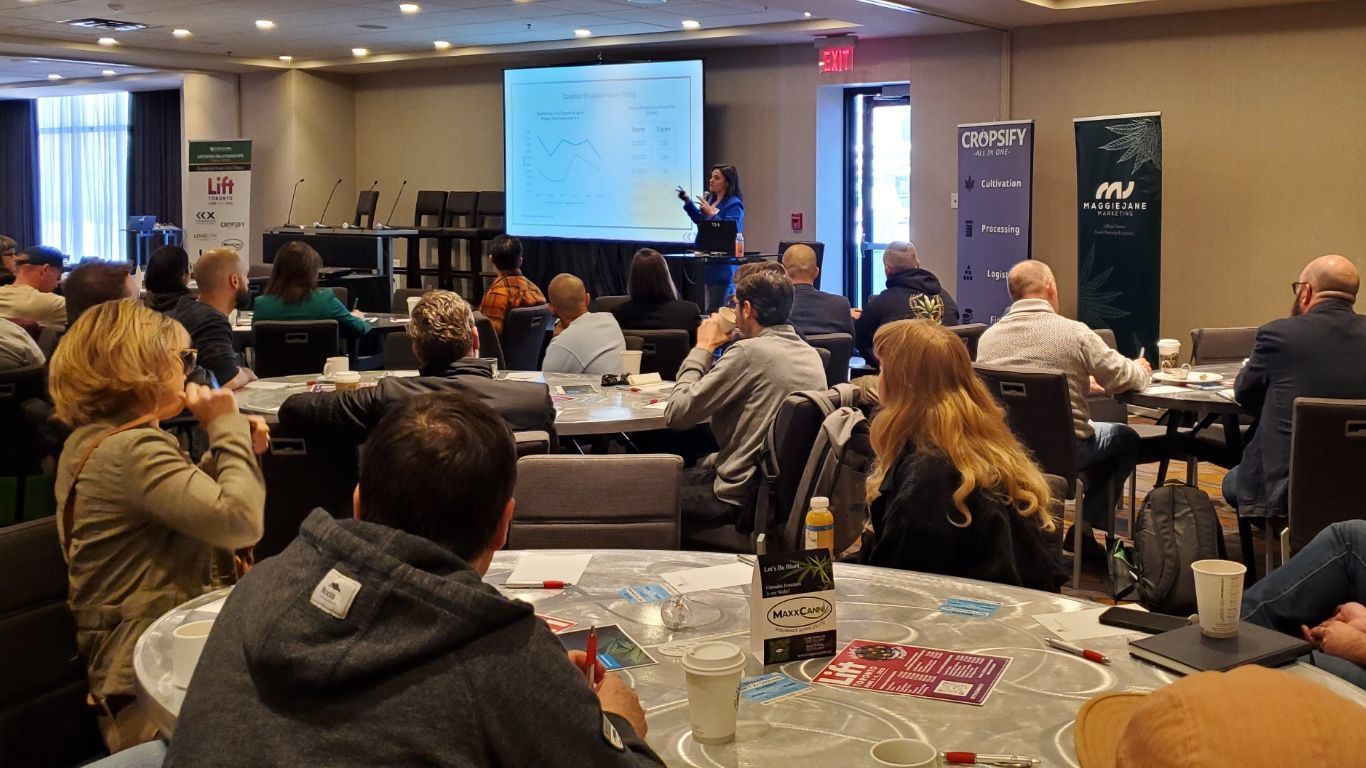Growing Relationships Alberta – 2023 Synopsis
On Saturday, April 29, 2023, StratCann held its signature Growing Relationships event in Calgary, Alberta. This event brought together more than 120 local and national cannabis businesses, including producers, retailers, ancillary services, and others.
Below is a recap of some of the current industry and regulatory challenges raised and discussed by attendees at the Alberta 2023 event.
StratCann’s Growing Relationships is a series of networking events designed to engage focused discussion on local industry and regulatory challenges, opportunities, and solutions. The third in the ongoing series, our Calgary event included a one-hour industry brainstorming session asking attendees to discuss industry issues from their various points of view.
StratCann’s host, David Brown, led attendees through the exercise. With a 10-minute timeframe, 16 tables of ~8 stakeholders each discussed what they see as the most critical issues facing their businesses and the industry overall at this time. Each table selected a spokesperson to present their discussion items to the room.
Tables included an array of stakeholders, so while responses varied, particular trends also emerged.
While many of the more commonly-known issues, such as high federal excise tax and the overall regulatory burden, frustrations with the 10mg THC limit for cannabis edibles, and challenges in accessing capital were raised, many more unique issues emerged, including opportunities for industry to take the lead with changes that don’t require action from regulators.
Summary of Discussion Items
Several common points and themes emerged, many of which were raised at our previous events in Ontario and BC. These included: concerns with the accuracy of THC levels; a desire for more consistency with how producers are labelling products—especially around things like packaging date and harvest date; and a need for producers to know which stores are carrying their products and, ideally, at what volume and price points.
Many also feel that if provinces provided producers with better info on where and how their products are selling, this could help combat pay-to-play “kickbacks” often disguised as data deals.
Another point raised by several attendees was the desire from producers to have the option for a direct delivery model in Alberta similar to BC’s approach, or at least a flow-through model similar to Ontario. Many producers feel this would help them see better movement on smaller shipments/SKUs that might otherwise get lost inside the AGLC. This approach would allow them to cater to the retailers who understand and have a demand for these more unique, niche and craft products.
Other themes relating to a lack of consistency emerged at several levels. Producers and retailers agree there is inconsistent enforcement of federal and provincial rules, especially in Alberta. This includes communication between provinces, communication between producers, and different provincial interpretations of federal rules.
One common example is how the AGLC seems to have a much stricter interpretation and enforcement of federal marketing and promotion rules than other provinces. Retailers feel this makes it more difficult for consumers to find accurate info about legal cannabis. It gives an advantage to the numerous, easily-available illicit online stores with no such hurdles in place.
Another example was that at the provincial level, some producers and retailers feel the AGLC is inconsistent with its enforcement, even between producers and stores. Producers also raised issues of variability in the interpretation of regulations from federal inspectors (ROEB) and even among QAPs. Some producers also spoke of the challenge with some QAPs coming from pharma and not fully understanding SOPs that relate to a living plant.
Retailers would like to be able to open products in-store to allow consumers to inspect them. They also want to see minors allowed in-store if accompanied by an adult, making things consistent with rules for alcohol. The current system means parents either cannot purchase cannabis while out with their kids like they would nearly any other product, or they have to leave their kids outside.
Many retailers also shared that security clearance requirements for retail workers in Alberta are too onerous. There is no need for police background checks for employees, for example, or at least police checks and AGLC checks (SellSafe) could be more harmonized and streamlined.
AGLC’s new rules around sampling were praised, but several questions and concerns were also raised. More than a few retailers and producers said they still need more guidance from AGLC on how to provide sampling. Also, the sample size limit of 3.5 grams of dried cannabis or its equivalency is too small for producers selling extracts, vapes, infused products, etc.
The idea of price floors for Alberta retailers was also raised as a way to help encourage a more level playing field for smaller independent retailers, which could make for a healthier, more diverse industry than if it’s just a few large chains.
Overview: Regulations and taxes are working against Health Canada’s mandate of a viable industry able to compete with the illicit market. The excessive administrative and financial burden on businesses inflates prices and limits innovation. This encourages the illicit market as they can better compete on price and consumer-desired production selection.
Key Topics: Along with issues like excise tax and 10mg THC limits, attendees mentioned there were too many bureaucratic delays and too many record-keeping requirements. Research protocol timelines are too long. Inconsistency with interpretation/enforcement of regulations by AGLC and Health Canada. A lack of collaboration between federal and provincial governments in general.
Overview: Red tape and bureaucratic delays are also a concern at the provincial level. There are too many variances between what AGLC wants in regard to record-keeping compared to Health Canada’s requirements. Retailers would like to see more of a hybrid model allowing for both current centralized distribution combined with a direct delivery or flow through model. Many producers say they need more clarity on how sampling can be done.
Key Topics: Better communication between the regulators, and from regulators to stakeholders; greater evolution of distribution and sales model; less strict enforcement of marketing rules.

Kicking off with a 2023 Wholesale Cannabis Pricing Outlook, from Canadian Cannabis Exchange

Prepping for the Retailer/Producer speed-dating!

Speed-dating in the sunshine!

Roundtable presentations

Retailer panel discusses their unique needs and perspectives


